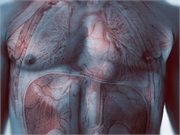- Could Your Grocery Store Meat Be Causing Recurring UTIs?
- Are You Making This Expensive Thermostat Error This Winter?
- Recognizing the Signs of Hypothyroidism
- 10 Strategies to Overcome Insomnia
- Could Artificial Sweeteners Be Aging the Brain Faster?
- Techniques for Soothing Your Nervous System
- Does the Water in Your House Smell Funny? Here’s Why
- Can a Daily Dose of Apple Cider Vinegar Actually Aid Weight Loss?
- 6 Health Beverages That Can Actually Spike Your Blood Sugar
- Treatment Options for Social Anxiety Disorder
How to Keep Those Blood Vessels Pumping

Want to know how to avoid blood clots and varicose veins?
One physician offers some tips on how to keep your blood vessels healthy.
Arteries and veins are collectively known as the vascular system. Arteries transport oxygen and nutrient-rich blood throughout the body, while veins carry de-oxygenated, waste-filled blood back to the heart to be renewed, explained Dr. Chelsea Dorsey, a vascular surgeon from University of Chicago Medicine.
Problems can occur in both arteries and veins. It’s estimated that 12%-20% of people older than 60 have peripheral arterial disease (PAD), and more than 40% of women have venous insufficiency, the underlying condition that leads to varicose and spider veins.
Blood clots in veins can occur at any age, and people at risk include those who are sick, injured or unable to walk for a period of time, and women who take birth control pills. Varicose veins are more common among younger people, and women are twice as likely as men to be affected, Dorsey noted.
Problems in arteries — such as atherosclerosis (narrowing or hardening of the arteries) — tend to increase with age.
The health of your arteries and veins is influenced by both genetics and lifestyle.
For example, the most common risk factors for varicose veins and venous insufficiency include a family history of these conditions, spending long periods of time on your feet, and multiple pregnancies, Dorsey said in a university news release.
You can reduce the risk of or help relieve vein conditions such as varicose veins and venous insufficiency through regular use of compression stockings and elevating your legs.
Eating a heart-healthy diet and maintaining a healthy weight also benefits both arteries and veins. Other ways to protect your artery health include preventing/controlling diabetes and blood pressure, using cholesterol-lowering medications, and not smoking, Dorsey said.
More information
The U.S. National Library of Medicine has more on vascular diseases.
Source: HealthDay
Copyright © 2026 HealthDay. All rights reserved.










